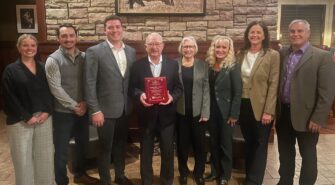3 Family Businesses Honored with Awards from Prairie Family Business Association
Recent News
Jolene Brown brings a few nontraditional tools when she meets with family businesses.
The veteran professional speaker and family business consultant starts with a mirror.
“Most people want me to work with them to fix somebody else,” she explains.
The mirror is a redirect.
“We have to start with the people at the table and where we’re at today,” she continues. “It is important to understand the history behind the business, yet in order to proceed, you must begin with those invested in and choosing to improve the family and business.”
She also brings a box of tissues.
“There’s always emotion,” she acknowledges.
“Resentment, anger, fear, worry, tears. And when emotion and logic collide, emotion wins. Use the tools. If mom cries, hand her tissues. Suggest ‘Go ahead and cry it out. When you’re done we can talk about it.’ ”
Brown brings a roll of duct tape too.
“It’s not just so they will listen,” she explains. “Sometimes, metaphorically, I have to tape them to their chair. Someone wants to say their piece and walk off. Some get so emotional they want to just escape. Since you chose to meet and invited me to be there, you must remain present.”
And, finally, there’s a 2-by-4 board. Just in case.
“Sometimes, there’s no other way,” Brown said. “You just have to let them have it. It is a great wake-up-to tool!”
It’s all coming from a place of caring though. Brown wants those in family business to increase their productivity, profitability and peace of mind. She wants them “to sit happily together at a holiday table.”

Brown, who grew up on a farm in Iowa, guides family businesses across North America through the sometimes tough stuff of expressed or broken promises, wishes not contracts, decision-making and accountability.
In the case of families, the goal is to “stop fighting on the way to the funeral home,” as she puts it.
The popular author and speaker will give a keynote speech at the upcoming Prairie Family Business Conference April 29 and 30, which includes both an in-person and virtual attendance option.
Brown gave us a preview of what to expect.
First, the title. “Stop fighting on the way to the funeral home.” Explain.
All understand what that means. We know brothers or sisters or aunts or uncles, or we see our neighbor’s family members aren’t speaking. Why? Because they didn’t do things when times were good. Instead, silence or lack of decision-making and action leaves them in a real mess, angry and frustrated, unable to grieve or celebrate a life well lived. Nothing beats planning and clear communication with the guidance of good advisers.
You’ve seen the mistakes families make that lead to broken businesses. How much of it is preventable? Are there some common themes?
About 95 percent or more of people who reach out to me are operating as a family-first business. “Let’s not rock the boat.” “We don’t want to make Dad mad.” “I think there’s a will.” “We will all get along.” They’re operating on a habit, tradition, hope and assumption.
A much better choice is to operate as a business-first family. This does not say the business is more important than the family. Instead, it means we love and honor the family so much we’re going to do the business right. How much can be prevented? A great deal. Communication is key. In some situations, people don’t have to like what you’re doing, but they deserve to know the rules of the game, then decide whether they want to play.
There are really good advisers to help you do the work so things become positive and productive, assuring that the business might continue if that is your goal.
Do you want to sit together happily at a holiday table? If so, you must operate as a business, then you have a chance to be family. I’ll share tested template tools to help with the management and leadership of the process.
Your presentation will address the “in-laws and the out-laws.” What do you mean by that?
They’re your best friends or worst enemies. A young woman once asked me, “How long do you have to be married before you get to be family?” I’ve had the families who transition the business assets by bloodline only with the in-laws cut out of ownership, and then you want them to sign a personal guarantee for a business loan. How do you get the support and buy-in from a spouse? How are they assured security?
It can be the taboo topic – money. You say it’s all about expectations. How do you set those or approach that conversation?
When you treat it as a business, discussion and decision-making regarding money is an acceptable and necessary topic. This includes net worth, cash flow, income, expenses, ROI and compensation packages. You learn to pay employees based on the value each brings the business, not genetics. We must be careful of expectation and entitlement. This is a business, not a birthright.
What do you want people to take away from hearing you speak?
I want them to understand that silence is the great killer of the family and the business, and the way you honor your family is by doing the business right. During my presentation, I’ll share lessons from my 30-plus years of helping families fix, grow or transition their business. They’ll receive template tools currently used by many successful family businesses. It is so important that all key players and generations of a business attend. You greatly increase your odds for positive progress and peace of mind.
This is a day filled with interaction, laughter and real-life stories to reinforce the important take-home value. As we have our eyes opened to the realities and opportunities of a family business, we are clearly reminded that a successful family business requires work, done now.



